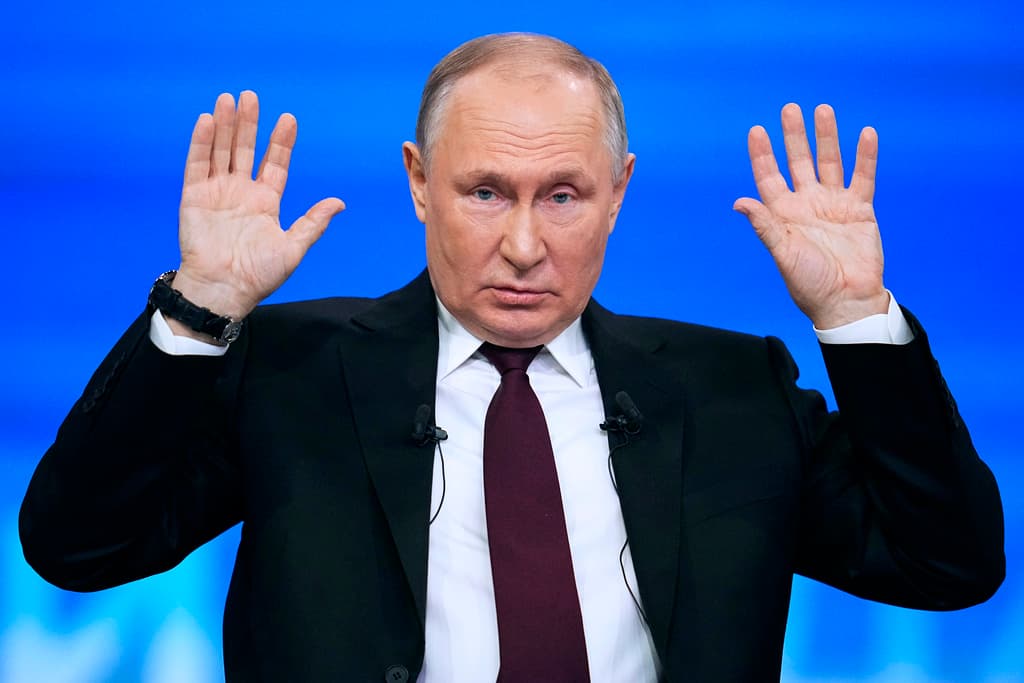Putin Promises Not To Invade Poland
Poles weren’t fooled by Putin’s posturing to Tucker Carlson.

“Don’t believe it until the Kremlin denies it.” That has been a good rule of thumb for Russia-watchers since Vladimir Putin rose to power almost 25 years ago. On Thursday night, Mr. Putin did it again, smoothly reassuring Tucker Carlson: “We have no interest in Poland, Latvia or anywhere else. Why would we do that? We simply don’t have any interest.” Flashing his crocodile smile, Mr. Putin went on to cite Poland by name 36 times.
Readers may recall that two years ago, Russia’s leader repeatedly assured the world that he did not plan to invade Ukraine. Then, on February 24, he invaded Ukraine. Right now, Mr. Putin’s army is in no shape to invade any more countries, beyond a small Baltic, or two. However, Russia’s leader is 71, a decade younger than President Biden. Russia’s army lost half of its tanks in Ukraine, but its massive arms industry survives almost untouched.
Russia’s recipe is a 1930s German strudel — rearmament, a national sense of victimization, and an aggressive imperialist running the show. Bad blood between Poland and Russia may be obscure to many Americans. It is, though, as real as the phony history that Mr. Putin peddled. The biggest whopper was that the Poles caused World War II. “They overplayed their hand, and they forced Hitler to start the Second World War by attacking Poland.”
Two years ago, victim blaming was one rationale for sending 100,000 troops into Ukraine. Most of modern Poland was ruled by Moscow from the late 1700s until the end of World War I. Looking beyond Ukraine, Mr. Putin has said the Kremlin’s goal is to reestablish its suzerainty over lands traditionally ruled from Moscow. With many slices of history from which to draw, he chooses the early 20th century highwater mark.
On the west, Catholic Poland represents the biggest “threat” to Orthodox Russia. Poland may have only one quarter of Russia’s 144 million people, but its free market economy has grown to half the size of Russia’s. “Poland’s Western-backed success represents the major challenge to Russia’s domination of what Putin sees as its rightful sphere of influence,” economist Noah Smith blogged Friday, “The Ukraine War is Ultimately About Poland.”
Hours after Mr. Carlson’s Kremlin interview, Poland’s foreign ministry felt obliged to post: “A statement on President Vladimir Putin’s 10 lies on Poland and Ukraine which were not rectified by Tucker Carlson.” Poles needed no persuading. “Mr. Carlson played the role of a useful idiot,” said Szymon Hołownia, speaker of Poland’s parliament. “He gave the microphone to a liar, a murderer, and an international terrorist.”
A year ago, in the Global Attitudes Survey of the Pew Research Center, Poles had the most negative views of Russia among citizens of 24 major nations surveyed. Of Poles surveyed, 98 percent had unfavorable attitudes toward Russia, well above the global average of 82 percent. Savvy American politicians are aware of the clout of the Polish-American votes. As recently as 2010, Polish-Americans accounted for 10 percent of votes cast.
Yet Poles, like many Europeans, worry about the reliability of America and NATO. On Saturday, Reuters reports, President Trump seemed to recount to a political rally a meeting he’d had with NATO. “One of the presidents of a big country stood up, said: ‘Well sir if we don’t pay, and we’re attacked by Russia, will you protect us?’ I said: ‘You didn’t pay? You’re delinquent?’ He said: ‘Yes, let’s say that happened.’ No, I would not protect you.’”
“In fact,” Mr. Trump said he’d said, “I would encourage them to do whatever they want. You gotta pay.” A White House spokesman called the comments “appalling and unhinged.” So Poles have a Plan B. To block Russia, they heavily back Ukraine. As a fallback, they are spending four percent of national output on defense. That’s double the NATO goal. Warsaw says the idea is to create “the most powerful land army in Europe.”

